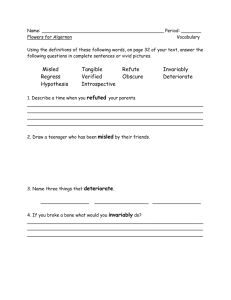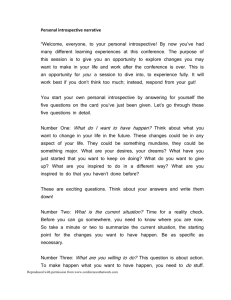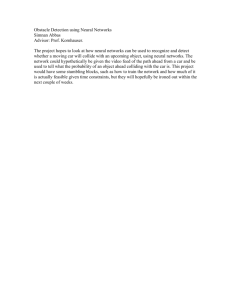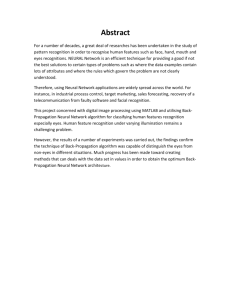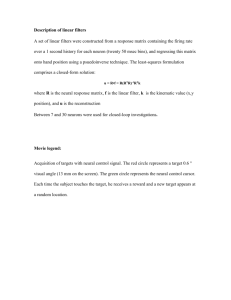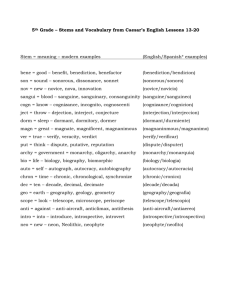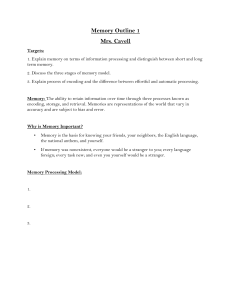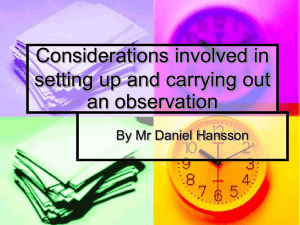Action Learning at Asia School of Business Leading and Managing
advertisement
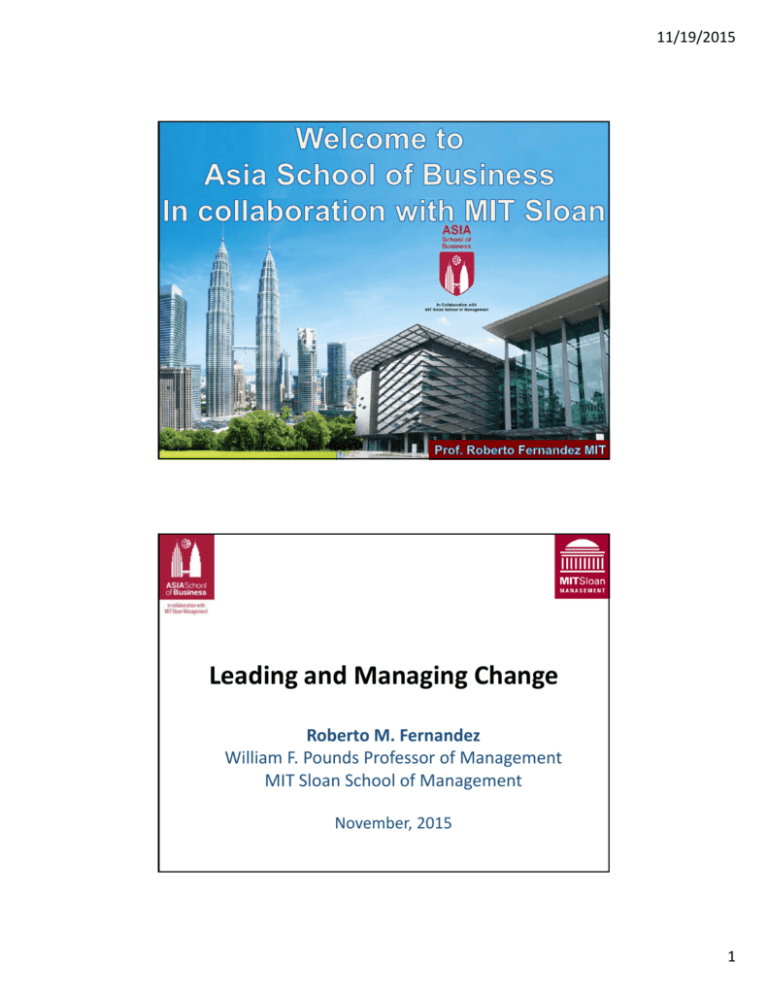
11/19/2015 Action Learning at Asia School of Business Leading and Managing Change Roberto M. Fernandez William F. Pounds Professor of Management MIT Sloan School of Management November, 2015 1 11/19/2015 Plan for Our Time Together • Introduce myself • My approach to teaching and learning • Leading and Managing Change – The Psychology of Getting Things Done • Framework – A “User’s Guide” to People With Brains Plan for Our Time Together • Introduce myself • My approach to teaching and learning • Leading and Managing Change – The Psychology of Getting Things Done • Framework – “User’s Guide” to People With Brains 2 11/19/2015 Plan for Our Time Together • Introduce myself • My approach to teaching and learning • Leading and Managing Change – The Psychology of Getting Things Done • Framework – “User’s Guide” to People With Brains ”The hard stuff is easy; it’s the soft stuff that is hard.” Ray Stata, founder Analog Devices 3 11/19/2015 Plan for Our Time Together • Introduce myself • My approach to teaching and learning • Leading and Managing Change – The Psychology of Getting Things Done • Framework – “User’s Guide” to People With Brains Basketball! 4 11/19/2015 One reptilian legacy is that as our eyes sweep across the field of view, they make tiny jumps. At the points between where the eyes alight, what reaches the brain is blurry, so the visual cortex sees the neural equivalent of jump cuts. The brain nevertheless creates a coherent perception out of them, filling in the gaps of the jerky feed. What you see is continuous, smooth. Newsweek article “In Our Messy, Reptilian Brains” Our visual system’s bandwidth is about 1Mb/sec. (slower than speed of a cable modem [10mb]) Biological basis for “Inattentional blindness”? (Gorilla video) 5 11/19/2015 6 11/19/2015 7 11/19/2015 The Phenomenal Power of the Human Mind I cdnuolt blveiee taht I cluod aulaclty uesdnatnrd waht I was rdanieg. The phaonmneal pweor of the hmuan mnid! Aoccdrnig to a rscheearch at Cmabrigde Uinervtisy, it deosn't mttaer inwaht oredr the ltteers in a wrod are, the olny iprmoatnt tihng is taht the frist and lsat ltteer be in the rghit pclae. The rset can be a taotl mses and you can sitll raed it wouthit a porbelm. Tihs is bcuseae the huamn mnid deos not raed ervey lteter by istlef, but the wrod as a wlohe. Amzanig huh? Yaeh, and I awlyas thought slpeling was ipmorantt. And This One? • 7H15 M355463 53RV35 70 PR0V3 H0W 0UR M1ND5 C4N D0 4M4Z1N6 7H1N65! 1MPR3551V3 7H1N65! • 1N 7H3 B361NN1NG 17 W45 H4RD BU7 N0W, 0N 7H15 L1N3 Y0UR M1ND 15 R34D1N6 17 4U70M471C411Y W17H 0UT 3V3N 7H1NK1N6 4B0U7 17, • B3 PR0UD! 8 11/19/2015 What do you call a tree with acorns? An Oak What’s Roberto’s favorite beverage? Coke 9 11/19/2015 What do you call a funny story? A Joke What’s another word for a cape? A Cloak 10 11/19/2015 What does a fire produce? Smoke What do you call the white part of an egg? 11 11/19/2015 Why the Emphasis on Brains? • Because you have one! Key Ideas • The structure of the “original equipment” affects our behavior in predictable ways – Shortcuts economize mental energy • Our brains run on 20 watts of power • Regularities – Not rational – There is a pattern to the irrationality – PREDICTABLE • Our ability to guide change depends on understanding the raw material 12 11/19/2015 Universal? • Toys 25 Charlie Chaplin http://www.wired.com/2009/04/schizoillusion 13 11/19/2015 Culturally Universal? Culturally Universal? 14 11/19/2015 Dan Kahneman Amos Tversky Intellectual Background • Cognitive Psychologists – Amos Tversky, Daniel Kahneman (2002 Nobel winner) – Flesh out the ways in which we are incapable of being rational • Show ways in which the mind actively constructs reality – To a large extent, we see what we expect to see… 15 11/19/2015 Intellectual Background • …And do not see what we do not expect (think Gorillas) • ACTIVE: Do NOT think of white elephants… – “The jury shall disregard…” – “Failure is not an option…” Our “Original Equipment” • Before our very eyes… 16 11/19/2015 Dimensions of Neural Functioning Camerer et al. J Econ Lit 2005;XLIII:16 Cognitive Emotional Controlled Processes: Conscious, serial, effortful, deliberative, good introspective access I II Automatic processes: Unconscious, parallel, effortless, reflexive, no introspective access III IV 34 The Curse of Expertise • “Autopilot” responses • In BP, in mining disasters…overriding the automatic alarms oDuct tape over the annoying alarm button • Normalize deviance…No longer mindful • Who are the More Mindful? oNew people – people who do not share your assumptions oNSA – High School Students!!! 17 11/19/2015 Limbic System From: Purves et al. Neuroscience Dimensions of Neural Functioning Camerer et al. J Econ Lit 2005;XLIII:16 Cognitive Emotional Controlled Processes: Conscious, serial, effortful, deliberative, good introspective access I II Automatic processes: Unconscious, parallel, effortless, reflexive, no introspective access III IV 18 11/19/2015 Volitional vs. Emotional Smile Dimensions of Neural Functioning Camerer et al. J Econ Lit 2005;XLIII:16 Cognitive Emotional Controlled Processes: Conscious, serial, effortful, deliberative, good introspective access I II Automatic processes: Unconscious, parallel, effortless, reflexive, no introspective access III IV 19 11/19/2015 Trust “Oxytocin increases trust in humans” Nature 435, 673‐676 (2 June 2005) http://www.nature.com/nature/journal/v435/n7042/abs/nature03701.html Cinnabon http://online.wsj.com/news/articles/SB100014240527023034687045795739 53132979382 48 20 11/19/2015 49 Basement ‐ The Scentee http://www.newsweek.com/2014/09/19/digitising‐humanity‐about‐take‐another‐huge‐ step‐forward‐smell‐269729.html 50 21 11/19/2015 Dimensions of Neural Functioning Camerer et al. J Econ Lit 2005;XLIII:16 Cognitive Emotional Controlled Processes: Conscious, serial, effortful, deliberative, good introspective access I II Automatic processes: Unconscious, parallel, effortless, reflexive, no introspective access III IV Body Language 22 11/19/2015 Facial Expressions • Paul Ekman found that 7 facial expressions appear to be universal • Anger, Disgust, Fear, Interest, Joy, Surprise, Sadness Which Baby is Which? Anger, Disgust, Fear, Interest, Joy, Surprise, Sadness 23 11/19/2015 Joy Anger Disgust Surprise Interest Sadness Fear Which Baby is Which? Anger, Disgust, Fear, Interest, Joy, Surprise, Sadness Dimensions of Neural Functioning Camerer et al. J Econ Lit 2005;XLIII:16 Cognitive Emotional Controlled Processes: Conscious, serial, effortful, deliberative, good introspective access I II Automatic processes: Unconscious, parallel, effortless, reflexive, no introspective access III IV 24 11/19/2015 “Anxious Eyes,” James Stanfeld 1987 Dr. Zbigniew Religa • The picture of Dr. Zbigniew Religa was taken by James Stanfeld in 1987 and appeared in the National Geographic Magazine that year. Titled “Anxious Eyes,” it depicts the exhausted yet vigilant surgeon after 2 heart transplant operations within 24 hours in antiquated conditions, monitoring his patient, and his exhausted assistant asleep in the corner. Dr. Religa died a few years after this picture was taken. 25 11/19/2015 • A second photograph appeared in the National Geographic years later. This picture captures the patient pointing to the picture of himself on the operating table – having outlived his surgeon by almost two decades. 26 11/19/2015 • A second photograph appeared in the National Geographic years later. This picture captures the patient pointing to the picture of himself on the operating table – having outlived his surgeon by almost two decades. • It is this laser‐like emphasis on near heroic self‐ sacrifice to enable long, fruitful and happy lives in our patients which takes the best from our existing culture and makes it tangible and relevant to this project. 27 11/19/2015 Dimensions of Neural Functioning Camerer et al. J Econ Lit 2005;XLIII:16 Cognitive Emotional Controlled Processes: Conscious, serial, effortful, deliberative, good introspective access I II Automatic processes: Unconscious, parallel, effortless, reflexive, no introspective access III IV Endowment Effect • Once you have something, you value it more – Thaler randomly gave out free Coffee Mug – Buying price: $2.75 – Selling price: $5.25 • Sloanies: – 2000 – Avg. purchasing price: SpringFall $3.37 $2.62 – Avg. selling price: $10.87 $9.62 28 11/19/2015 Endowment Effect • Once you have something, you value it more • Fact of owning something makes it more valuable to the owner • How quickly? • Buying a car… Buy In • Ownership experiments – Cake mixes and IKEA • Implications? 29 11/19/2015 Social Psychology • Fundamental Attribution Error – Lee Ross • Fish • What is going on with the blue fish? 93 94 30 11/19/2015 Mirror Neurons 31 11/19/2015 Subliminal Sociality • Contagious sociality – Mirror Neurons Social Proof • People follow the lead of similar others – Elevated pressure • Especially under conditions of uncertainty – For example… 98 32 11/19/2015 Ultimatum Game • Two players … One has $10, makes an offer to split it with the second person – If Accepted: both keep the $ – If Rejected: Neither get anything – Alan Alda – It is irrational to ever reject…Free money! Fairness • fMRI shows that emotional centers of the brain light up with splits of $7 / $3 or worse. 33 11/19/2015 Oxytocin and Fairness Figure 1. Oxytocin and generosity. UG offer minus average minimum acceptable offer) for those receiving OT or placebo. Generosity is 80% larger in the OT group (p = 0.005, N = 68). Fairness • Our not so distant relatives too… 34 11/19/2015 Wrap Up Dimensions of Neural Functioning Camerer et al. J Econ Lit 2005;XLIII:16 Cognitive Emotional Controlled Processes: Conscious, serial, effortful, deliberative, good introspective access I II Automatic processes: Unconscious, parallel, effortless, reflexive, no introspective access III IV 35 11/19/2015 Resistance to Change • In many ways, innovation and change are psychologically unnatural • Structure of Our Brains ▫ Cognitive Biases • Biology ▫ Amygdala and fear, Trust, Mirror Neurons • Social Psychology ▫ The group as a lever Habits Escalator 36 11/19/2015 Action Learning at Asia School of Business 37
